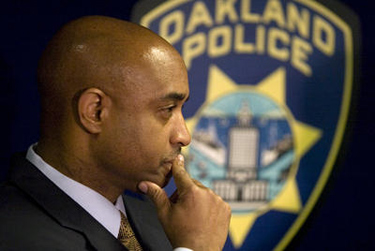Police Chief Anthony Batts said Thursday he is "very concerned" about the possibility of losing a significant number of police officers in a department he said is already overworked.

Police Chief Anthony Batts said Thursday he is "very concerned" about the possibility of losing a significant number of police officers in a department he said is already overworked. (D. Ross Cameron/Staff)
Oakland is facing a roughly $31 million budget deficit for the fiscal year beginning July 1, and City Council members appear increasingly serious about the possibility of laying off as many as 200 police officers to help fill that gap. No deal has been finalized, however.
"I'm very concerned," Batts said, when asked about the possible layoffs. He noted he has said publicly the department is already overworked. "We're going in the opposite direction of where we really need to go. Does that cause me concern? Absolutely."
At the same time, he said the organization will have to work with the "cards we're dealt." If officers are cut, Batts said, the focus will be on putting officers in black-and-white patrol cars.
"Our focus will be on our core mission," he said. "Our core mission is when people pick up the phone and say, 'I need a police officer' that they get a police officer there."
News broke last week that the department was preparing for the possibility of layoffs, even though it has not received a final number on how many officers - if any - will lose their jobs. Batts said in conversations with rank-and-file officers, he has urged them "not to have hysteria" since no decisions have been reached.
Some are clearly worried, however. Officer Michael Morris, 25, who works a swing shift in mid-East Oakland, went through the police academy and joined the department in 2008 after finishing a tour of duty in the U.S. Marine Corps. Now, he's worried about losing his job - and the home he bought last year.
"Right now it's very difficult," he said. "We try to do the best job we can. This job is very stressful. This is just an added, unnecessary stress for us. I definitely think I could lose my house. Working as an Oakland police officer is what I've come to know."
The City Council recently directed City Administrator Dan Lindheim to approach the police and fire unions about reopening their contracts, but both unions agreed to givebacks last year. In the police union's case, officers agreed to open a closed contract and give back millions in order to save jobs in the department.
"We're always willing to sit down and discuss the financial situation with the city," said Sgt. Barry Donelan, vice president of the Oakland Police Officers Association. "We've had informal discussions with (city) officials. A lot of our members are scared to lose their jobs." If 200 officers are cut, he said, "The city will be less safe than it is now."
As it is, reports of serious crime in Oakland are down 16 percent compared with this point last year. But Oakland's budget crisis is crippling, and if the city lays off police officers, it automatically loses $20 million in annual funding provided by Measure Y, a 2004 public safety ballot measure that pays for 63 police officers, and fire and violence-prevention programs.
Police, fire and debt service make up roughly 85 percent of Oakland's general fund, meaning it is all but impossible to balance the 2010-11 budget without finding a new revenue stream such as a parcel tax, laying off police officers or securing major givebacks from the unions - or some combination of those options.
If Oakland loses Measure Y, it not only loses the 63 officers plus violence-prevention programs, but also $4 million in Fire Department funding for programs that are mandated by agreements between firefighters and the city that predate the 2004 measure.
That would likely mean even deeper cuts to the Police Department to cover the $4 million loss. Mayor Ron Dellums' administration this year suggested putting a $180-a-year parcel tax and a smaller utility users' tax increase on the November ballot to generate about $20 million annually. But council members and others have doubts a parcel tax so large could win voter approval.
There are no good choices, Lindheim said.
"It's not prudent to bet the farm on the election in November," he said. "It's also not prudent to lay off 200 cops and cut all your violence-prevention services going into the summer. It's a terrible choice to face, and we're doing everything possible to take measures to avoid that choice."
When the complexities of Measure Y are taken into account, city figures show that in order to save $20 million in general fund money for the 2010-11 year, Oakland would have to cut 192 officers in June. If officials waited and placed an item on the November ballot and it failed, 385 officers would have to be cut to reach the $20 million in savings.
Councilmember Ignacio De La Fuente (Glenview-Fruitvale) said this week Oakland cannot wait any longer. He said the city should sell city golf courses, the Henry J. Kaiser Convention Center and cut the Police Department's non-sworn Neighborhood Service Coordinators. Then, he said, the city should ask for a 9 percent contribution from police officers to their pensions. And if that doesn't work?
"Then you have to lay (police officers) off," he said. "There's no other way to do it. I would love to have some other options, but we don't have other options. We should be sending the pink slips now."
Sign on to their Facebook account to show support for the OPOA.











